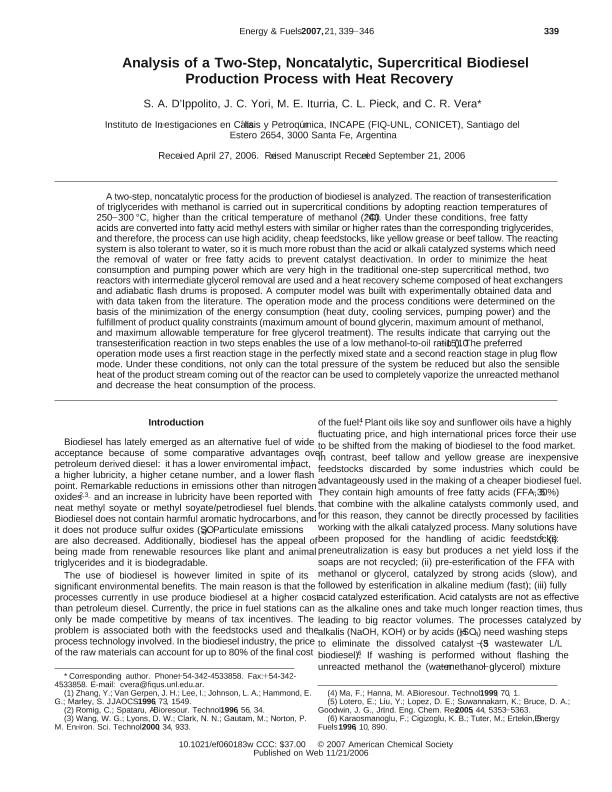Artículo
Analysis of a two-step, noncatalytic, supercritical biodiesel production process with heat recovery
D'ippolito, Silvana Andrea ; Yori, Juan Carlos
; Yori, Juan Carlos ; Iturria, M. E.; Pieck, Carlos Luis
; Iturria, M. E.; Pieck, Carlos Luis ; Vera, Carlos Roman
; Vera, Carlos Roman
 ; Yori, Juan Carlos
; Yori, Juan Carlos ; Iturria, M. E.; Pieck, Carlos Luis
; Iturria, M. E.; Pieck, Carlos Luis ; Vera, Carlos Roman
; Vera, Carlos Roman
Fecha de publicación:
01/2007
Editorial:
American Chemical Society
Revista:
Energy & Fuels (print)
ISSN:
0887-0624
Idioma:
Inglés
Tipo de recurso:
Artículo publicado
Clasificación temática:
Resumen
A two-step, noncatalytic process for the production of biodiesel is analyzed. The reaction of transesterification of triglycerides with methanol is carried out in supercritical conditions by adopting reaction temperatures of 250-300 °C, higher than the critical temperature of methanol (240 °C). Under these conditions, free fatty acids are converted into fatty acid methyl esters with similar or higher rates than the corresponding triglycerides, and therefore, the process can use high acidity, cheap feedstocks, like yellow grease or beef tallow. The reacting system is also tolerant to water, so it is much more robust than the acid or alkali catalyzed systems which need the removal of water or free fatty acids to prevent catalyst deactivation. In order to minimize the heat consumption and pumping power which are very high in the traditional one-step supercritical method, two reactors with intermediate glycerol removal are used and a heat recovery scheme composed of heat exchangers and adiabatic flash drums is proposed. A computer model was built with experimentally obtained data and with data taken from the literature. The operation mode and the process conditions were determined on the basis of the minimization of the energy consumption (heat duty, cooling services, pumping power) and the fulfillment of product quality constraints (maximum amount of bound glycerin, maximum amount of methanol, and maximum allowable temperature for free glycerol treatment). The results indicate that carrying out the transesterification reaction in two steps enables the use of a low methanol-to-oil ratio (10-15). The preferred operation mode uses a first reaction stage in the perfectly mixed state and a second reaction stage in plug flow mode. Under these conditions, not only can the total pressure of the system be reduced but also the sensible heat of the product stream coming out of the reactor can be used to completely vaporize the unreacted methanol and decrease the heat consumption of the process. © 2007 American Chemical Society.
Palabras clave:
Biodiesel
Archivos asociados
Licencia
Identificadores
Colecciones
Articulos(INCAPE)
Articulos de INST.DE INVEST.EN CATALISIS Y PETROQUIMICA "ING. JOSE MIGUEL PARERA"
Articulos de INST.DE INVEST.EN CATALISIS Y PETROQUIMICA "ING. JOSE MIGUEL PARERA"
Citación
D'ippolito, Silvana Andrea; Yori, Juan Carlos; Iturria, M. E.; Pieck, Carlos Luis; Vera, Carlos Roman; Analysis of a two-step, noncatalytic, supercritical biodiesel production process with heat recovery; American Chemical Society; Energy & Fuels (print); 21; 1; 1-2007; 339-346
Compartir
Altmétricas



